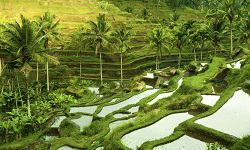Ecology & Environmental Engineering
Ecology includes the study of plant and animal populations, plant and animal communities and ecosystems. Ecosystems describe the web or network of relations among organisms at different scales of organization. Since ecology refers to any form of biodiversity, ecologists research everything from tiny bacteria's role in nutrient recycling to the effects of tropical rain forest on the Earth's atmosphere. An ecosystem service is assistance to society derived from a healthy ecosystem property or process. Robust soil quality leads to more water available for plant roots and cleaner water in streams and lakes. Enhanced soil biological activity turns organic wastes into valuable nutrients and degrades toxic elements. Ecosystem services are a way of putting a value on biodiversity by looking at what it does and how we value the function that the soil performs. Environmental engineering system can also be described as a branch of applied science and technology that addresses the issues of energy preservation, protection of assets and control of waste from human and animal activities. Furthermore, it is concerned with finding plausible solutions in the field of public health, such as waterborne diseases, implementing laws which promote adequate sanitation in urban, rural and recreational areas.
- Ecosystem management
- Watershed Ecology
- Environmental economics-sustainable services and systems
- Ecological Development
Related Conference of Ecology & Environmental Engineering
Ecology & Environmental Engineering Conference Speakers
Recommended Sessions
- Archaeology
- Ecology & Environmental Engineering
- Economic Geology & Geochemistry
- Environmental Geology
- Environmental Sustainability
- Geology and Geophysics
- Geology in Civil Engineering
- Global Warming & Climate Change
- Groundwater Foundation & Hydrology
- Marine Geology & Oceanography
- Mining and Soil Exploration
- Natural Hazards & Disaster Management
- Oil and Gas Reservoir
- Paleontology & Paleo-anthropology
- Petroleum Geology
- Remote Sensing & GIS of Environment
- Sedimentology Geology & Stratigraphy
- Soil and Rock Mechanics
- Structural Geology
- Volcanology & Plate tectonics

